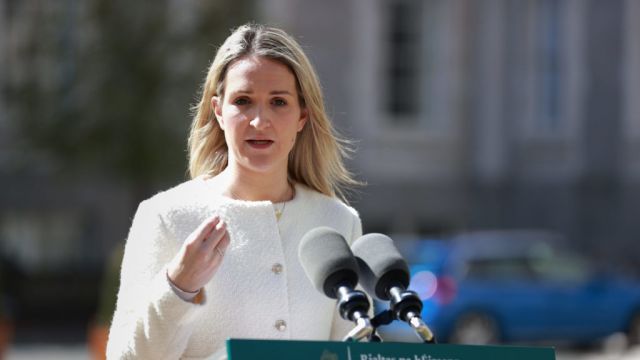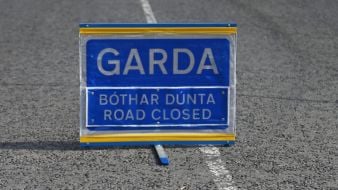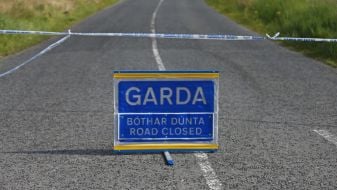Minister for Justice Helen McEntee has said that the plan to redesignate the UK as a safe country to which asylum seekers can be returned is a measure to close any loopholes and to put into effect an arrangement already in place with the UK.
Speaking on her way into Cabinet, Ms McEntee told RTÉ radio that the arrangement with the UK had been in place post Brexit and since Covid but had not been put into effect because of a High Court ruling.
“What I'm doing with this legislation is addressing the High Court's ruling and making sure that we close any loopholes that currently exist. We have to be able to return people to the UK, but there is an arrangement in place.
"We've been working with the UK and I don't expect that that will change. This is one of a number of measures that I'm bringing forward and that I have been doing to make sure that we have an immigration system that's firm but fair.
“Most importantly, fast processing has already seen any country designation under this, the numbers drop significantly. We have had returns in the past, but this is a separate arrangement that was put in place since Brexit. So we have had to engage with the UK, and it's very important that we engage with the UK post-Brexit to make sure that we have arrangements in place.
“It has not been effective because of Covid and because of the High Court's ruling. But we cannot have a loophole or a system where we cannot effectively return people. Despite comments that have been made, this arrangement is already in place.
"We have been working with the UK, and I look forward to continuing working with the UK to make sure that we prevent any type of abuses of the Common Travel Area and that we work together in that effect and, irrespective of comments that have been made, it has not been made clear to me that we won't continue to work with each other.
“And that's the way that I'm operating here. Our relations are strong and they need to be. We have extremely close connections and ties between Ireland and the UK.
"We have arrangements in place when it comes to migration to other countries, and that is because of our close ties, because of the Common Travel Area. And we would continue to work through any issues that arise.
“I look forward to meeting my counterparts in the coming weeks, but we will address this issue with many others as well, and I don't expect that to change. This meeting will happen in the coming weeks and we have already spoken about rearranging it. So this is not about anybody snubbing anybody.
We are working collectively together, and I think that's the approach that always needs to be taken with extremely close ties here.’
Figures from Northern Ireland
The CEO of the Irish Refugee Council, Nick Henderson, has questioned the accuracy of the figure that 80 per cent of those applying for asylum in Ireland had entered Ireland through the land border with Northern Ireland
“To us, that sounds too high,” he told RTÉ radio’s Morning Ireland. “Eighty per cent is extremely high. And it's important to note that just because a person has not applied for protection at an airport, for example, Dublin Airport or at a port, it does not automatically mean that the person has crossed the border from Northern Ireland.
“A person may also apply for asylum after a change in conditions in their country. For example, we've been working with people from Gaza who need to apply for asylum. So to us it sounds high. And until the department publishes its methodology and workings on this, it remains to be seen as to whether it's accurate.
“That being said, though, there is no doubt that the purposeful dysfunction in the UK's asylum system, which is extremely serious, unprecedented efforts. And it's now in law to limit access to the asylum process in the UK, this has had a consequence on people coming here. There's no doubt about that, I believe.”
Mr Henderson did acknowledge that there had been an increase in people arriving from the North of Ireland seeking asylum because of the UK’s ‘Rwanda policy.’
“It's important to note that the Rwanda policy is just one part of the Illegal Migration Act. That act makes it nearly impossible to lodge an application for asylum in the United Kingdom. The United Nations refugee agency in London, which has a high threshold for comment on these issues, stated that that act is, in effect, a ban on asylum in the UK.
"There's various provisions in that act that are yet to be commenced. But when they will be commenced, and we expect that to be to be soon, even in a matter of days or weeks, it would make it extremely difficult, if not impossible, to lodge an application for asylum.
"So in a way, it's not a surprise at all that people, we don't know how many, would not feel safe in the UK but would move to Ireland.”
Mr Henderson added that it was important to note that the return order to the UK would still have to meet the various requirements that are in Section 21 of the International Protection Act.
The Department of Justice would have to show that a person had sufficient connection to the United Kingdom, “and that could be things like time spent in the country, family connections and cultural connection."
"They would have to show that the person would be readmitted. And that's entirely unclear based on what Rishi Sunak said yesterday and also Sunday."







